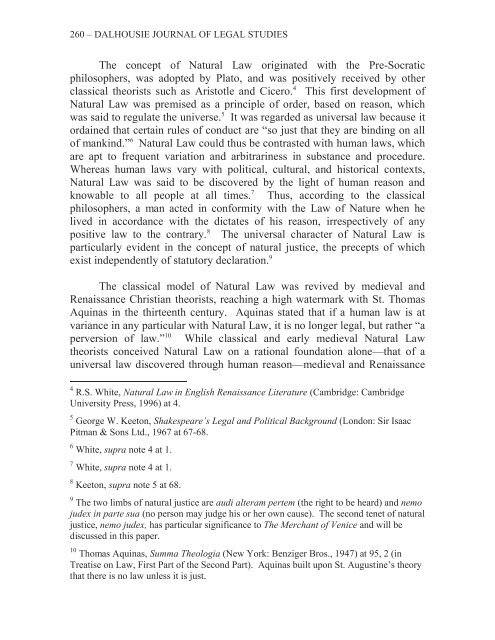(comic) tragedy of formalism in shakespeare's the ... - Goodmans
(comic) tragedy of formalism in shakespeare's the ... - Goodmans
(comic) tragedy of formalism in shakespeare's the ... - Goodmans
Create successful ePaper yourself
Turn your PDF publications into a flip-book with our unique Google optimized e-Paper software.
260 – DALHOUSIE JOURNAL OF LEGAL STUDIES<br />
The concept <strong>of</strong> Natural Law orig<strong>in</strong>ated with <strong>the</strong> Pre-Socratic<br />
philosophers, was adopted by Plato, and was positively received by o<strong>the</strong>r<br />
classical <strong>the</strong>orists such as Aristotle and Cicero. 4 This first development <strong>of</strong><br />
Natural Law was premised as a pr<strong>in</strong>ciple <strong>of</strong> order, based on reason, which<br />
was said to regulate <strong>the</strong> universe. 5 It was regarded as universal law because it<br />
orda<strong>in</strong>ed that certa<strong>in</strong> rules <strong>of</strong> conduct are “so just that <strong>the</strong>y are b<strong>in</strong>d<strong>in</strong>g on all<br />
<strong>of</strong> mank<strong>in</strong>d.” 6 Natural Law could thus be contrasted with human laws, which<br />
are apt to frequent variation and arbitrar<strong>in</strong>ess <strong>in</strong> substance and procedure.<br />
Whereas human laws vary with political, cultural, and historical contexts,<br />
Natural Law was said to be discovered by <strong>the</strong> light <strong>of</strong> human reason and<br />
knowable to all people at all times. 7 Thus, accord<strong>in</strong>g to <strong>the</strong> classical<br />
philosophers, a man acted <strong>in</strong> conformity with <strong>the</strong> Law <strong>of</strong> Nature when he<br />
lived <strong>in</strong> accordance with <strong>the</strong> dictates <strong>of</strong> his reason, irrespectively <strong>of</strong> any<br />
positive law to <strong>the</strong> contrary. 8 The universal character <strong>of</strong> Natural Law is<br />
particularly evident <strong>in</strong> <strong>the</strong> concept <strong>of</strong> natural justice, <strong>the</strong> precepts <strong>of</strong> which<br />
exist <strong>in</strong>dependently <strong>of</strong> statutory declaration. 9<br />
The classical model <strong>of</strong> Natural Law was revived by medieval and<br />
Renaissance Christian <strong>the</strong>orists, reach<strong>in</strong>g a high watermark with St. Thomas<br />
Aqu<strong>in</strong>as <strong>in</strong> <strong>the</strong> thirteenth century. Aqu<strong>in</strong>as stated that if a human law is at<br />
variance <strong>in</strong> any particular with Natural Law, it is no longer legal, but ra<strong>the</strong>r “a<br />
perversion <strong>of</strong> law.” 10 While classical and early medieval Natural Law<br />
<strong>the</strong>orists conceived Natural Law on a rational foundation alone—that <strong>of</strong> a<br />
universal law discovered through human reason—medieval and Renaissance<br />
4 R.S. White, Natural Law <strong>in</strong> English Renaissance Literature (Cambridge: Cambridge<br />
University Press, 1996) at 4.<br />
5 George W. Keeton, Shakespeare’s Legal and Political Background (London: Sir Isaac<br />
Pitman & Sons Ltd., 1967 at 67-68.<br />
6 White, supra note 4 at 1.<br />
7 White, supra note 4 at 1.<br />
8 Keeton, supra note 5 at 68.<br />
9 The two limbs <strong>of</strong> natural justice are audi alteram pertem (<strong>the</strong> right to be heard) and nemo<br />
judex <strong>in</strong> parte sua (no person may judge his or her own cause). The second tenet <strong>of</strong> natural<br />
justice, nemo judex, has particular significance to The Merchant <strong>of</strong> Venice and will be<br />
discussed <strong>in</strong> this paper.<br />
10 Thomas Aqu<strong>in</strong>as, Summa Theologia (New York: Benziger Bros., 1947) at 95, 2 (<strong>in</strong><br />
Treatise on Law, First Part <strong>of</strong> <strong>the</strong> Second Part). Aqu<strong>in</strong>as built upon St. August<strong>in</strong>e’s <strong>the</strong>ory<br />
that <strong>the</strong>re is no law unless it is just.
















